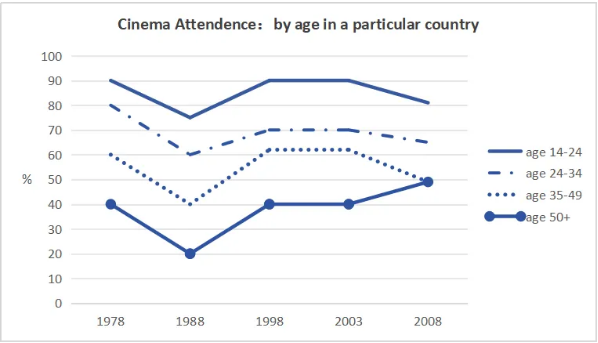速览!12月28日雅思考试题目回忆!
12月28日参加了雅思考试,考完之后感觉心情跌到了谷底。这不仅是2024年最后一场雅思纸笔考试,而且今天的阅读部分简直让人崩溃!题目中的答案难以捉摸,时间完全不够用,整个过程手忙脚乱的……阅读文章特别长,读到后面就忘记了前面的内容,不禁让人感叹,究竟要到什么时候才能彻底告别雅思呢??
听力
Part 1 餐厅预订表
题型:填空
1.waterworth
2.birthday
3.78
4.children
5.Italian
6.1050
7.cake
8.guitar
9.Wednesday
10.review
Part 2 城市交通博物馆
题型:单选
11.A
12.C
13.C
14.A
15.H
16.F
17.E
18.G
19.A
20.C
Part 3 讨论做电视频道及广告
题型:单选
21.B
22.D
23.G
24.A
25.C
26.F
27.B
28.C
29.A
30.C
Part 4 建筑与气候的关系
题型:填空
31.cities
32.acid
33.stone
34.bank
35.rainfall
36.glass
37.wood
38.soil
39.movement
40.guidelines
阅读
Passage1:豆子
1.B
2.A
3.E
4.A
5.C
6.FALSE
7.TRUE
8.NOT GIVEN
9.FALSE
10.NOT GIVEN
11.parent plant
12.glasshouse
13.trails
Passage2:和船相关
待回忆
Passage 3:地球建筑
待回忆
小作文
折线图:电影院观众:特定国家的年龄分布
The line graph shows the percentage of different age groups of cinema visitors in a particular country from 1978 to 2008.
大作文
Some people claim that it is acceptable to use animals for the benefit of human beings, while others argue that it is wrong for human use. Discuss both views and give your own opinion.
大作文写作思路和高分范文推荐
引言
简述话题背景:人类长久以来利用动物资源以满足自身需求。
引出争议:关于人类为自身利益使用动物的行为,社会上存在支持与反对两种截然不同的观点。
阐明目的:本文将探讨这两种观点,并提出个人见解。
支持利用动物的观点
1.历史与生存需求
历史上,动物是人类食物链的重要组成部分,对早期人类生存至关重要。
现代社会中,畜牧业仍然是许多国家和地区的主要经济来源。
2.科学研究与医疗进步
动物模型在药物研发、疾病研究及治疗方法探索中扮演关键角色。
疫苗开发、器官移植等领域取得的成就很大程度上依赖于动物实验。
3.教育与娱乐价值
动物园、水族馆等场所提供了了解动物、学习自然知识的机会。
马戏团、电影等娱乐形式中动物表演丰富了人类文化生活。
反对利用动物的观点
1.伦理与道德考量
动物拥有感知痛苦和快乐的能力,应享有基本权利,不应被当作工具或商品。
动物实验和虐待行为违背了尊重生命的原则。
2.生态平衡与环境影响
过度捕猎、栖息地破坏导致物种灭绝,破坏生态平衡。
工业化畜牧业对环境造成污染,如温室气体排放、水资源消耗等。
3.替代方法的可行性
随着科技发展,越来越多的实验可以通过计算机模拟、细胞培养等方式进行,减少对动物的依赖。
植物性食品和健康生活方式的推广,降低了对动物产品的需求。
个人观点
1.平衡与适度原则
承认动物对人类社会的贡献,但强调应在尊重动物权益、维护生态平衡的前提下合理利用。
支持发展可持续畜牧业,减少对环境的影响。
2.推动科技创新
鼓励和支持科学研究探索更多非动物实验方法,减少对动物的依赖。
投资于替代技术的发展,如人工智能在医疗研究中的应用。
3.提升公众意识
加强动物保护教育,提高公众对动物福利的认识。
倡导负责任的消费行为,选择对环境友好、动物友好的产品。
结论
综上所述,人类利用动物的行为需基于深思熟虑的平衡考量,既要满足人类合理需求,也要尊重动物权益,维护地球生态平衡。
通过科技创新、公众教育及政策引导,我们可以朝着更加和谐的人与动物共存关系迈进。
高分范文推荐
In the intricate tapestry of human history, animals have consistently played a pivotal role, serving as companions, food sources, and even tools for scientific advancement. This symbiotic relationship has, however, sparked a fierce debate: is it morally justifiable to use animals for the benefit of humanity? This essay endeavors to explore both sides of the argument, ultimately presenting a nuanced perspective that seeks to balance human needs with ethical considerations.
Proponents of utilizing animals often invoke historical precedence and practical necessity. Throughout human civilization, animals have been integral to survival, providing not only sustenance but also clothing and labor. In contemporary society, the livestock industry remains a cornerstone of economies worldwide, supporting millions of livelihoods. Furthermore, animal research has revolutionized medicine, leading to groundbreaking treatments for diseases such as cancer and AIDS. Animal models enable scientists to test drugs and therapies safely before they are administered to humans, thereby safeguarding public health. Moreover, zoos and aquariums serve as vital educational hubs, fostering understanding and appreciation for biodiversity.
Conversely, opponents argue that the exploitation of animals for human gain violates fundamental ethical principles. They contend that animals, capable of experiencing pain, fear, and joy, deserve respect and protection akin to human beings. The practice of animal experimentation, they assert, is inherently cruel and unnecessary, given the advent of advanced technological alternatives such as computer simulations and synthetic tissues. Furthermore, the industrial farming of animals has devastating environmental consequences, contributing to deforestation, water scarcity, and greenhouse gas emissions. These issues underscore the urgent need to reconsider our reliance on animals and seek sustainable, cruelty-free solutions.
My own perspective aligns with a middle ground that acknowledges both the practical benefits derived from animals and the ethical imperatives that demand their humane treatment. Firstly, it is crucial to adopt a sustainable approach to animal husbandry, promoting practices that minimize environmental impact and ensure animal welfare. This includes reducing antibiotic use, improving living conditions, and exploring plant-based alternatives to animal products. Secondly, the scientific community must continue to innovate, prioritizing the development of non-animal research methods that maintain scientific rigor while respecting animal life. Finally, society must foster a culture of empathy and responsibility, encouraging individuals to make informed choices that reflect a deep respect for all living beings.
In conclusion, the debate surrounding the use of animals for human benefit is multifaceted and complex. While animals have undeniably contributed to human progress, it is imperative that we navigate this relationship with mindfulness and compassion. By embracing sustainable practices, fostering technological innovation, and nurturing a sense of ethical stewardship, we can strive for a world where human advancement does not come at the expense of animal welfare or environmental health. This balanced approach will ultimately pave the way for a more harmonious coexistence between humans and animals, fostering a future that benefits all sentient beings.
以上就是关于《速览!12月28日雅思考试题目回忆!》介绍。爱思学,您的教育规划师,提供全国雅思培训机构课程免费试听,快速了解费用明细,排名、校区地址,欢迎咨询预约400-808-1765。













